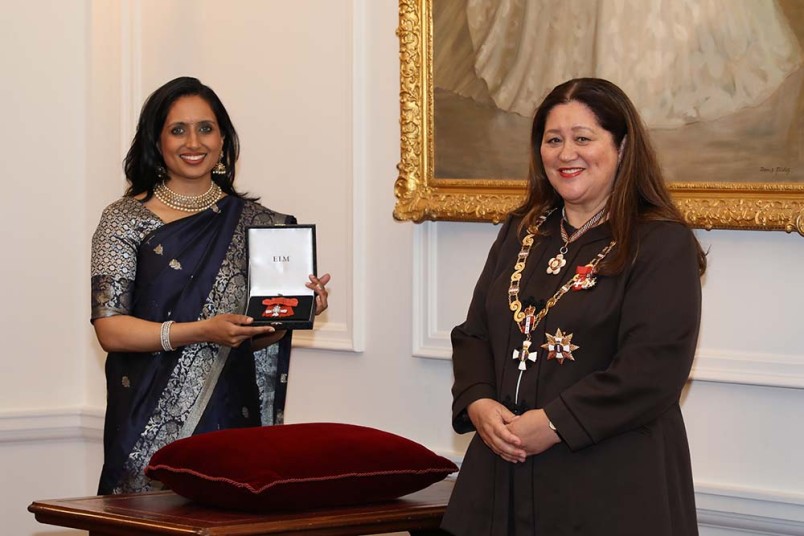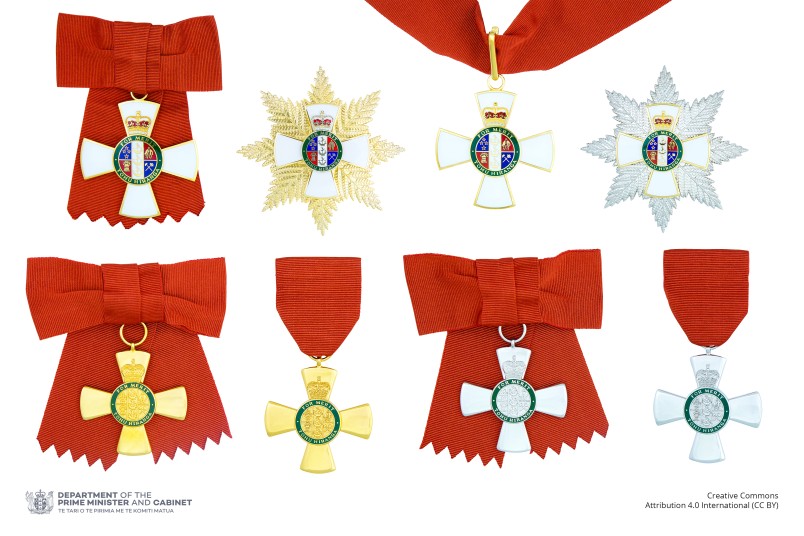Introduction
Thank you for identifying someone who you think deserves a Royal New Zealand Honour.
This step-by-step guide is to help you nominate a person for a Honour.
In your nomination, you need to tell an accurate and clear story about the nominee (the person being nominated). This should include information and examples about their service and achievements, the impact they have had on others, and what makes them suitable for an Honour.
Let’s get started!
Download this guide (PDF, 1.6MB)
About the nomination process
Nominators (people who nominate someone for an Honour) can make a nomination at any time. Once submitted, the nomination will be considered for the next available Honours.
Honours are announced twice a year, at New Year and on the King’s Birthday public holiday.
It is important to keep the nomination confidential. Make sure the nominee does not know they are being nominated, or who nominated them.
Download the nomination form from the Department of Prime Minister and Cabinet (DPMC) website.
Tips and advice for making a nomination
Before writing the nomination, make a list about what makes the nominee special.
Some things to consider:
Services and activities
- What services/activities did they provide and to who?
- How have they served their community, region, or New Zealand?
- How have they demonstrated innovation or entrepreneurship, or shown selfless voluntary service to improve the lives of others?
- How long have they carried out their services/activities?
Achievements
- What have they achieved?
- Why are these achievements significant?
- What has been the impact of their services/activities?
- Who has benefited from their services/activities and how?
- Have they received an award, or had news items published about them?
- Have they worked in jobs that relate to their achievements?
Please note, the person must still be alive and working, or have recently retired.
Involving others in the process
Talk to community members or leaders to get their input and to check that they also support the nomination. They may be aware of other ways the nominee has contributed to the community. Add these to your list. It is helpful to find other people in the community who agree that the nominee is worthy of a nomination.
We suggest you form a small team and work together to gather the required information, discuss, and write the nomination.
Your team may include:
Team Leader: Coordinates the nomination, including giving tasks to the team and providing information to the writer in a timely manner.
Community Advisors: People who can provide details about the nominee’s achievements, either through their own knowledge or getting information from others.
Writer: Someone who is a good writer and can draft the nomination. Consider asking someone with an interest in research or perhaps a student.
Reviewer: Someone to review the completed nomination to make sure it makes sense, is correct and nothing has been missed.
Remember, the nominee cannot know they are being nominated. Please remind these people to keep the information confidential.
Completing the nomination form
The rest of this guide will explain DPMC’s nomination form and provide advice and tips to help you complete the application.
Section 1
This section is about the person making the nomination (the nominator). If you are nominating someone for an Honour, enter your details here.
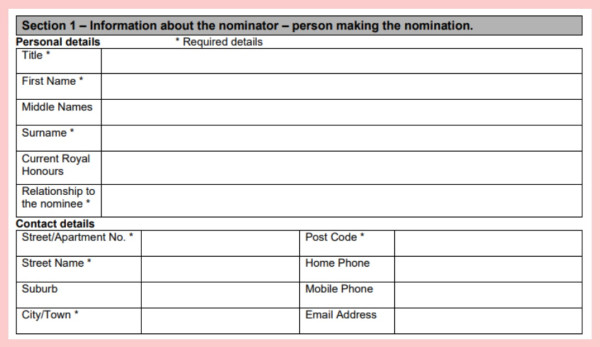
Section 2
This section is about the person you are nominating for an Honour (the nominee). Enter the nominee’s details here.
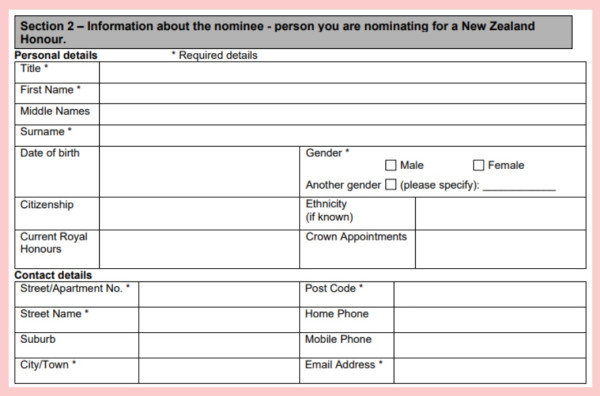
Section 3
The numbered questions in this section are those which are in the nomination form. Refer to the points below the questions to help you think about what information to include and how to get that information. You can also consider information outside of these guidelines.
Discuss these questions and suggestions with your nominations team. Take notes and consider these notes when writing clear information about the nominee in the application.
1: Describe the service and achievements of the nominee
Briefly outline the nominee’s background and relevant history (e.g., personal circumstances, employment, information about how they became involved in what they are being nominated for).
- Explain how they have significantly contributed to the community, region, New Zealand, or overseas. What organisations have they been involved in, and for how long? What did they do?
- Provide details about their achievements. Have they won any awards? What impact have they had?
- What makes them special?
- Describe how they have demonstrated innovation or entrepreneurship.
- Have they volunteered? Describe their work.
Remember, the DPMC team has no other information about the nominee. Your answer must be detailed so the reader can easily understand the nominee’s service and contributions.
2: Describe the contribution the nominee has made to one or more of the following; their local community, their region, New Zealand as a whole, and/or internationally
Explain how the nominee has contributed to the community through their service or actions.
You may wish to consider:
- How have they made a positive difference that may not have happened otherwise?
- Who has benefitted from their service/actions and how have they benefitted? Include how many people have benefitted.
- Provide specific examples of their contributions and include facts and numbers to support these.
- What roles has the person served in, and for how long?
- What has been the long-term impact of their service and achievements?
Have they:
- encouraged new partnerships or collaborations?
- helped achieve economic growth?
- improved sustainability?
- promoted cultural heritage, traditions, or local history?
- started a service or organisation? Include feedback from others.
Include examples and quotes about the impacts of the nominee’s contribution that can support the nomination.
Remember, the DPMC team has no other information about the nominee. Your answer must be detailed so the reader can easily understand the persons’ service and contributions.
3. Describe what makes the nominee’s service and achievements stand out above and beyond that of their peers, or above and beyond what might reasonably be expected as part of their paid employment:
Explain how the nominee has gone beyond general expectations.
You may wish to consider:
- How have they demonstrated exceptional leadership?
- What projects/initiatives set them apart, and why?
- How have they helped to create change?
- What sacrifices or personal investments have they made?
- How have they encouraged collaboration within the community?
- What difference have they made?
- How have they impacted other people’s lives?
- Explain how big their impact has been.
Provide specific examples and/or quotes from people who have had contact with the nominee and are aware of the impact they have had.
Your examples must be detailed and specific so a reader can understand what the nominee has done without having prior understanding or context.
4: Describe how the nominee’s service and achievements are regarded by their colleagues, and whether they have been formally recognised by their colleagues or through other awards (e.g. life membership of an organisation, honorary doctorate, etc.)
Explain how the person has been recognised by others for their contribution or service. Share statements and/or testimonials from:
- community group members (including from community organisations the nominee is not involved in)
- colleagues and managers
- people in public positions (e.g., schools, universities, doctors, and local elected politicians)
- professional associations related to their work
- students or mentees
- people who have used or benefitted from the nominee’s service or other contributions.
Ask people who support the nomination to confirm:
- what impact the nominee has had
- what is the nominee’s reputation
- how the nominee has positively influenced them and/or their careers.
List any relevant awards, honorary doctorates, or memberships the nominee has received. Include the criteria for receiving such recognition. Please do not attach certificates or letters of appreciation.
Positions or offices held by the nominee
In this section, please provide the details for each position held by the nominee.

You may need to speak to other people in your community to confirm the start and end dates of the position or you can use the nominee’s LinkedIn (if they have one). Make sure to include all relevant roles they have had, including professional and volunteer positions. Please note: You can include years or total years if exact dates are not known (e.g. 1990-1998 or 10 years.
Letters of support
In this section, please add the names of the people providing letters of support or the names of the organisations. A minimum of two letters of support are required to support the nomination.
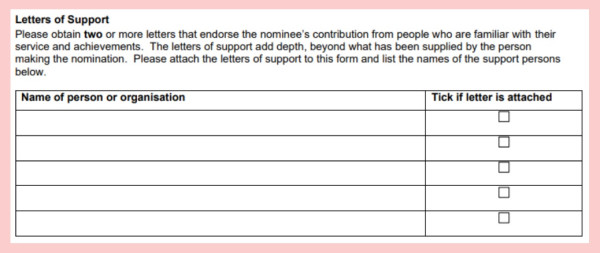 Letters should written by people who are not the nominator but who know about the nominee’s service and impact on the community. They must support the nominee for a New Zealand Royal Honour.
Letters should written by people who are not the nominator but who know about the nominee’s service and impact on the community. They must support the nominee for a New Zealand Royal Honour.
Letters should be about the individual's contribution and impact. They should reinforce the valuable contribution the nominee has made. Large numbers of support letters or letters which are not detailed will not help the nomination.
Who should write a letter of support?
The people writing a letter of support should know about the nominee’s achievements. It can be helpful to ask a range of different people and organisations. This will help form a comprehensive view of the nominee’s impact.
Examples of people who could write letters of support include:
- community leaders
- former students
- work colleagues
- local councillors
- people who used or benefitted from the nominee’s service or actions.
This is an opportunity to show their appreciation for the nominee by supporting their consideration for a significant award. Support letters can help confirm the nominee’s character and achievements.
Remember, the nominee cannot know they are being nominated. Please remind the people writing letters of support to keep the request confidential.
Requesting letters of support
While it might seem intimidating to request a letter of support, people are often happy to support and endorse the nomination, particularly if the nominee has positively impacted them. A phone call explaining the confidential process can be all it takes to influence someone to write a letter.
Tips to help write letters of support
To help the person writing the letter of support, you can provide them with information and context about the nomination. In their letter, the person could:
- Explain how they know the nominee and their involvement with them
- Describe how the nominee has served the community
- Confirm the impact the nominee has had on the community and include examples of this
- Share other examples that describe the nominee’s achievements, qualities and contributions
- Include more information which supports the key themes addressed in the nomination
- Mention specific awards or recognition the nominee has received, and the significance of these awards
- Explain why the nominee deserves the Honour.
Any questions?
If you have any questions or require guidance on preparing a nomination, please contact the Honours Unit at honours@dpmc.govt.nz or phone DPMC Honours Unit staff on (04) 830 5011.
View the Frequently Asked Questions on the DPMC website.
Submitting a nomination
Email the completed nomination, including at least two letters of support to honours@dpmc.govt.nz or post the nomination and letters to:
Honours Unit, Cabinet Office
Executive Wing
Parliament Buildings L10
Wellington 6011
Note, letters to Parliament do not require a stamp.
What happens after a nomination has been submitted?
Nominators will receive a formal letter that acknowledges the nomination and confirms the Honours list for which the nominee will be considered. No further communication about the nomination is provided. If the person is successful, they will be contacted by DPMC and asked if they would like to accept the Honour.
Announcements are made at New Year and on the King’s Birthday public holiday in June.
If the nominee is not successful, you can ask that the nomination be reconsidered and/or provide new information about their contribution.
Time to celebrate!
Congratulations for successfully submitting a nomination and promoting the contributions of ethnic individuals in your community!
It is a big effort to write a nomination, so now is the time to relax, unwind and celebrate your hard work. If you worked as a team, you may choose to celebrate together. You may like to reflect on the process and share key learnings, consider how to make things simpler next time, and think about who else could be nominated.

